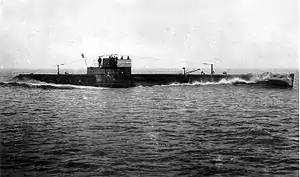HNLMS K II
K II was a unique patrol submarine of the Royal Netherlands Navy. The ship was built by Fijenoord shipyard in Rotterdam. The boat had a diving dept of 40 metres (130 ft).[2]
 K II | |
| History | |
|---|---|
| Name: | K II |
| Builder: | Fijenoord, Rotterdam |
| Laid down: | 20 November 1915 |
| Launched: | 27 February 1919 |
| Commissioned: | 28 March 1922 |
| Decommissioned: | August 1937 |
| General characteristics [1] | |
| Class and type: | none |
| Type: | Unique submarine |
| Displacement: |
|
| Length: | 57.31 m (188 ft 0 in) |
| Beam: | 5.29 m (17 ft 4 in) |
| Draught: | 3.82 m (12 ft 6 in) |
| Propulsion: |
|
| Speed: |
|
| Range: | |
| Complement: | 29 |
| Armament: |
|
Service history
The submarine was laid down in Rotterdam at the shipyard of Fijenoord on November 20, 1915. The launch took place on February 27, 1919. On March 28, 1922 K II was commissioned in the Dutch navy.[2]
On September 18, 1923 K II together with K VII, K VIII and the submarine tender Pelikaan began their journey to the Dutch East Indies, the ships' theater of operations. On board K II was professor F.A. Vening Meinesz who conducted gravity measurements. He left the ship in Colombo. The ships where delayed when Pelikaan ran aground at Tunis.
On December 11, 1923 the ships arrived at Sabang where they stayed until December 7. On December 7, they set sail for Tanjung Priok where they arrived at December 24, 1923.[2]
The boat was decommissioned in August 1937.[2]
References
- "Dutch Submarines: The K II submarine class". dutchsubmarines.com. 2012. Archived from the original on 24 June 2013. Retrieved 19 July 2013.
- "Dutch Submarines: The submarine K II". dutchsubmarines.com. 2012. Retrieved 19 July 2013.